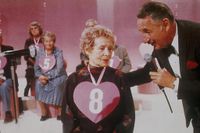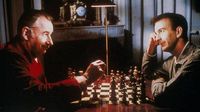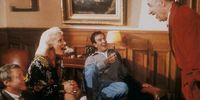On March 17, 2025, the acclaimed French film Masques will air on Arte at 20:55, providing viewers with a chance to rediscover Claude Chabrol's satirical take on the world of television presenters.
Released initially in 1987, Masques is directed by Chabrol, who teamed up with co-writer Odile Barski, marking their third collaboration following Violette Nozière and Le Cri du hibou. The film stars the legendary Philippe Noiret as Christian Legagneur, a successful television presenter and producer, whose charismatic exterior hides darker truths.
The plot centers around Roland Wolf, portrayed by Robin Renucci, who is eager to write Legagneur's biography. This endeavor leads him to spend several days at Legagneur's luxurious country house. Here, he encounters not just the enigmatic presenter but also the close-knit circle of individuals surrounding him, including family and staff members.
Chabrol uses the framework of Masques to explore deception. While Legagneur appears charming and captivating to his audience—specifically elderly contestants on his quiz show—his character reveals the sinister textures of celebrity when pressed. Wolf suspects there is more to this celebrated figure than meets the eye.
Philippe Noiret expressed during promotion for the film, "Personne ne m'a inspiré ! C'est la télévision, c'est les jeux, les émissions de jeux qui ont inspiré les scénaristes et puis moi, bien sûr. Personne n'est visé directement, c'est une métaphore qui englobe tout le système de ce genre d'émissions". He elaborated, describing his character as someone commanding authority and reveling in it: "J'ai pensé à un type avec le verbe haut, avec tout le monde qui rampe autour de lui. Il jouit de cette autorité, il en profite, il en abuse un peu."
Chabrol’s direction is characterized by his knack for unraveling the layers of human behavior, deploying humor alongside criticism. Masques touches upon the television industry’s obsession with stardom, mocking the superficiality of televised entertainment. The storyline is rife with revelations, as Wolf uncovers the unsettling truths hidden beneath the polished surface of fame.
The cast of Masques includes notable talents such as Bernadette Lafont and Anne Brochet, both contributing to the film's rich narrative texture. The ensemble brings vibrancy to the story—a mix of dark humor and atmosphere reminiscent of Alfred Hitchcock’s style, which Chabrol admired.
Upon its release, Masques garnered two nominations at the prestigious César Awards, enhancing Chabrol's reputation as one of the leading figures of French cinema. Bernadette Lafont was nominated for Best Supporting Actress, and Anne Brochet for Best Newcomer, indicating the film's impact on those involved.
The broadcast of Masques on Arte stands as not just another film airing, but as an opportunity to engage with Chabrol's critique of societal pillars, especially the media. It explores how entertainers can curate their public personas, often masking their true identities for commercial gain.
Now, twenty-five years after its initial release, Masques remains relevant. Its themes resonate within today's media-saturated environments, inviting audiences to reflect on the integrity of public figures and the nature of television itself.
Through the lens of Masques, viewers witness how Chabrol weaves his commentary on fragility behind fame and how legendre is not merely about the roles we play but the hidden truths we often fail to see.









